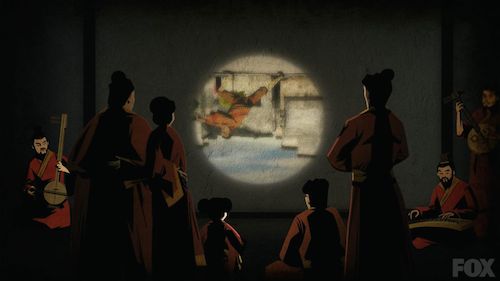 Culture & Ethics
Culture & Ethics
 Faith & Science
Faith & Science
On Cosmos, Neil Tyson Enlists a Chinese Philosopher in the Argument Against Faith — No, Make that Fate

Last night’s installment of Cosmos, “Hiding in the Light,” again beat the drum for its theme of science versus faith, with science cast in the recurring role of martyr to sinister, narrow-minded, probably religiously conservative forces.
Neil Tyson opened with an interesting depiction of a Chinese philosopher, Mo Tze also spelled Mozi, presented as a forward-looking advocate of scientific reasoning, insisting on proof, “questioning authority,” arguing “against blind obedience to ritual and authority,” etc. He is credited with an early description of a camera obscura, relevant to the episode’s theme of light and its properties.
One of Mozi’s essays is said by Dr. Tyson to have been “Against Faith” — that’s what it sounds like Tyson says, although I evidently misheard, as I would guess most viewers did. Mozi did argue against fate and fatalism. One of the essays attributed to his school is “Rejecting Fatalism,” not “Faith.”
After his death, bad guys are shown burning his works and burying his followers alive. Books or people being burned for trying to advance science is now a standard motif in Cosmos.
I had a suspicion that this is all a bit tendentious, and indeed the Stanford Encyclopedia of Philosophy gives a less propagandizing take. Sure enough, I asked our new friend and contributor Dr. Stephen Webb for his view. Was Mozi the standard-bearer of Cosmos�-style materialism that Tyson seems to imply? Webb missed the episode, but replied:
I’ve taught Chinese religion before, and everyone knows that Mozi was more religious than Confucius. Mozi actually appealed to Heaven (Tian) as an active agent in the world, which Confucius did not. He urged the state to encourage religious practices, another thing that Confucius didn’t! The Communists liked him because he criticized Confucius’s emphasis on tradition and the family. The Communists argued that his belief in ghosts and spirits was purely pragmatic, but no scholars today doubt the sincerity of his belief in the supernatural. His texts were suppressed, but the reason had to do ONLY with the victory of Confucianism and the fact that he was such an outspoken critic of Confucianism. Who writes these episodes anyway?
Yes, wouldn’t it be fascinating to have been a fly on the wall at the storyboard meetings that produced these scripts?
Tyson also lectures us, “Science needs the light of free expression to flourish. It depends on the fearless questioning of authority, the open exchange of ideas.” He’s right, but about when would you say that scientific culture, as represented in academia and the media, decided that adherence to authority is actually the more “scientific” attitude? Somewhere after 1859, I guess.
Tyson is an endearing man, despite the faults of this series. I like the way he solicitously turns his voice up in a question mark when the grammar of the sentence doesn’t call for it. You can see the episode here — it’s mostly innocuous and otherwise very nicely done.
I’m now on Twitter. Find me @d_klinghoffer.
